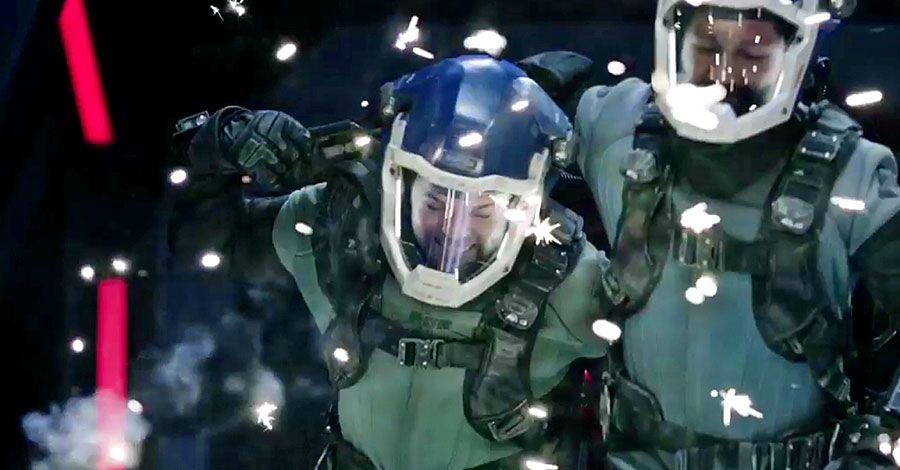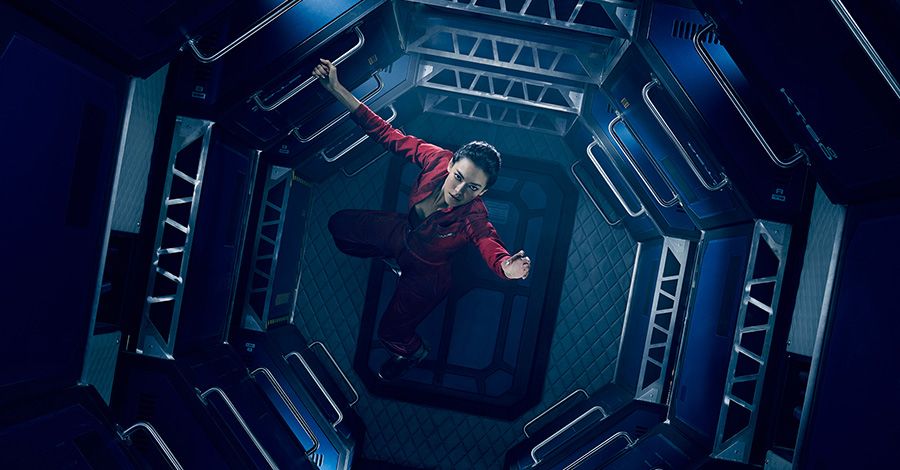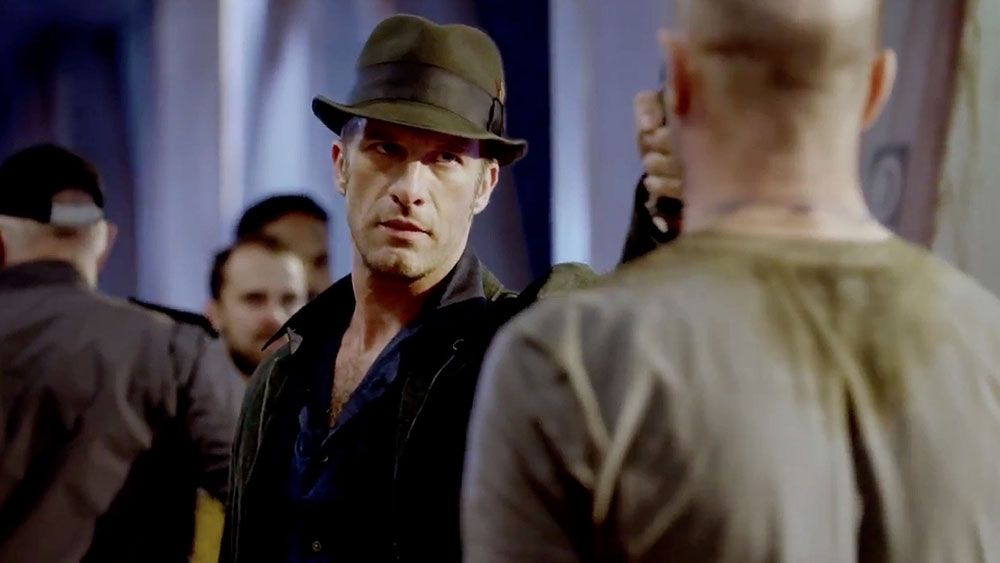Syfy's new sci-fi mystery "The Expanse" has drawn comparisons to the network's ground-breaking "Battlestar Galactica," and for good reason, as both space sagas are filled with action, drama, compelling characters and political conflict.
Based on the "Leviathan Wakes" book series by James S.A. Corey, (the pen name of co-authors Daniel Abraham and Ty Franck), "The Expanse" is set hundreds of years in the future, amid increasing tensions between UN-controlled Earth, the colonized Mars and the Asteroid Belt, which supplies both planets with resources.
The series introduces viewers to Holden, Naomi, Alex and Amos, the only four survivors of an attack on their ice freighter, who find themselves in the middle of a vast conspiracy that could push Earth, Mars and the Belt to the brink of war. However, it's Belt detective Joe Miller's (Thomas Jane) relentless search for the missing young woman that may hold the key to unraveling this mystery.
In a conversation with Executive Producers Naren Shankar, Mark Fergus and Hawk Ostby, we dig into what makes Syfy's latest hit tick. In addition to the challenge and necessity of fleshing out the show's source material, the EPs expand upon Miller and Holden's first meeting, whether Johnson is a friend or foe, the importance of answering questions for viewers rather than letting them simmer too long and why they went opted to drop viewers right into the thick of their universe rather than introducing them slowly.
Spinoff Online: Congratulations on getting an early Season 2 renewal. What was it like having that vote of confidence from the network?
Naren Shankar: It's fantastic. Alcon Television, who is our studio, was so confident, they loved the show so much that they actually started our writers' room in June or July. We've been developing Season 2 for a while. We were feeling pretty good about a second season, but it's great having Syfy give us a big vote of confidence.
Most freshman TV series take anywhere from a couple of episode to a full season to find their groove. Do you feel "The Expanse" skipped over that learning curve?
Mark Fergus: It depends on who you ask. We just felt we had to set up this universe the way we would love to see it. You feel like you've arrived somewhere. You have to learn the language and the rules. Part of the joy of it is putting that all together as the audience. It's a little overwhelming for some people. It rewards you hugely for some people. If you spend time in the world, you start putting everything together and loving it. We've had to learn that from audiences. Some people are more immediately receptive than other audiences. Ultimately, we'll make all those audiences happy if they invest a little time in our world.
Shankar: One of the advantages of the long-lead times of these cable orders is, we shot the show almost a year before we aired in terms of the pilot. We had a lot of time to work the material editorially and rework the material as we were going. It is a luxury you don't have outside of the straight-to-series model. We are obviously learning and have learned as we've gone along.
Hawk Ostby: It was a little strange to be working on things without having that audience reaction. When we started, there seemed to be two types of audience. One wants to be told everything and have everything spoonfed. Then, there's another segment of the audience who wants to add it up themselves. They like those mysteries and Easter Eggs. It's been very interesting looking online and reading what the fans are talking about.
First of all, they are incredibly clever in finding little things. I was thinking, "They are never going to get that." Not only did they get it, but they found little things we put in the background. I know a lot of people felt episode 1 was overwhelming. Then, they went back and watched it and went, "Hey, it's not that overwhelming. I understand it now." It's been intriguing to look at how audiences react to the various episodes.
How challenging was it to keep those familiar with the novels off balance, and to deliver surprises they didn't see coming?
Fergus: We're big fans of the books. We feel like there's so much the books didn't get to delve into, character-wise. To bring in new parts of the universe, we've woven several of the novellas into the texture of the show. Even if you know the books really well, you're going to be surprised by how the flesh-and-blood actors live these characters and make them real. Then, we're burrowing into the characters that the books didn't have the time or space to do. Then, the order in which we do it and the way we present the universe -- what we put the emphasis on and what we take the emphasis off of -- you can have loved the book, know it really well, watch the show, and it will feel like a re-experiencing of the books.
Holden, Alex, Naomi and Amos have been thrust into this pressure cooker situation where they're bickering and choosing sides. How much do they have each other's backs?
Fergus: The crew have their backs right off the bat. They are a pretty comfortable, family-like unit right off the bat in the books. We want to get them there, but one of our writers, Robin Veith, worked for a circus for years. She had this amazing analogy of how, "You can work with people, you can travel with them. You can pretty much eat, live, breathe 24/7 with them. That doesn't mean you know anything about them, what brought them there, what their secrets are, what they are running from or what they hope for in life until there is a crisis. When you are thrust together under really difficult circumstances, then, you start to learn about people." To skip over that learning curve of the crew with each other, you can't ever have that back. They always have each other's backs, so let's have them earn each other's love, respect and trust. To just arrive at the outset, you miss so much great story and so many great opportunities. It's not to create conflict, but this is how human beings tune in to each other. We felt like the book hinted at it, but didn't spend a lot of time on that.
Shankar: One of the first things I remember -- maybe even the first meeting of me, Hawk, Marc, Ty and Daniel -- it was, "The characters that you have on page one of the book, we'd like to get them there by about Season 3." It was that boldly stated. There is so much enjoyment because the audience is getting to know them as the characters get to know each other.
At this point, viewers know the Martians were framed for the destruction of Holden and company's vessel. How important is getting that information out there as opposed to simply being in survivor mode?
Shankar: We almost have this conversation at the beginning of episode five when they talk about, "Who the hell is going to believe us? Every time we're around, something it blows up. They are going to think we are terrorists. What are we going to do?"
Fergus: One of the things we backed off on in the books is a lot of information flying around. Everybody knows what everyone intended. We've taken that away with each adversary, so each party doesn't know what happened. They don't know who else knows what, they don't trust each other. You let a lot of the drama bubble up. Our guys are certainly in survivor mode, still. They are very interested in getting justice for the people on their ship that got blown up in the first episode. They also know they are starting to connect with something that feels bigger. There's something going on that is much larger than their particular concerns. They are at a crossroads, where it's just no longer their concerns and their agendas. For the entire rest of the season, they can't ignore this larger conspiracy going on.
Naomi voiced concerns about their would-be savior, Fred Johnson. How warranted is that mistrust?
Shankar: We can't really get into that, [but] it's a source of real concern. You've got a guy who was once a soldier for Earth. He clearly has his own agenda. Whether or not he's a guy who can be trusted is something that is going to be a source of conflict for some time. Stay tuned.
Ostby: He has such an interesting backstory, and there's much more to come. You have someone who might be trying to get the blood off his hands, or he might be a master political manipulator. You just don't know with Fred. We like that the audience is wondering as much as our crew is.
So far, we have three separate storylines unfolding in space, on Earth and Ceres. What can viewers expect from Holden and Miller's initial encounter?
Fergus: One of the joys of the books was reading these two perspectives, these two point-of-view characters, on a slow collision course with each other over Julie Mao. They don't know they are connected yet, but they are both working the same mystery from different angles. Inevitably, they are going to join forces. One of the joys of the books was waiting for that, anticipating that, and knowing that they both had different pieces of the puzzle. That's one of the most-fun things coming for audiences.
This first season is halfway to the finish line at this point. Last week's "Back to the Butcher" culminated with Miller being abducted, and Johnson reaching out to Holden and his crew. There's also this political uneasiness that could explode any moment. What can you tell us about the remaining episodes?
Fergus: Certainly, in the next episode, there's a fascinating look what Belter life is. What is the conflict really about with the Belters? What is their main burden existing in this universe with two superpowers like Earth and Mars? All the things you've mentioned are left hanging. You're going to get a great next move on all those major chess pieces. All the things that you are interested in now, that have been left dangling, are going to take some significant moves forward.
Ostby: You are going to start to get actual answers, now. The different moves, people and storylines are fairly complex, but now things are snapping into place. As these characters start moving towards one another, you are going to start getting answers to things.
"The Expanse" airs Tuesday nights at 9 p.m. on Syfy.



